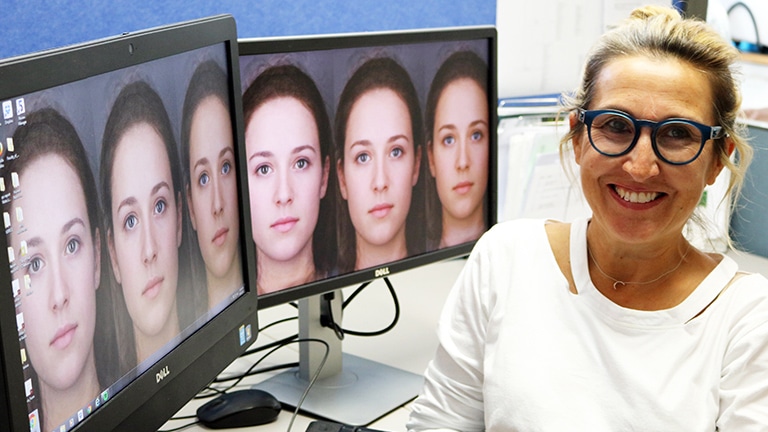
A new study shows young adults prefer skin colour associated with fruit and vegetables rather than sun exposure

New research has busted the myth that young adults perceive tanned facial skin to be healthy and attractive.
The study investigated whether young Australians associated a healthy complexion with melanin colouration from tanning, versus carotenoid colouration from fruit and vegetables.
Lead author, Dr Kristine Pezdirc, said it was important to know the health perceptions of young Australian adults in relation to skin colouring.
“Human skin colour is influenced by three pigments – haemoglobin, carotenoids and melanin. There are some concerns if young Australian adults perceive skin colouration from tanning (melanin) to be healthy. This group in particular has an increased risk of developing skin cancers as they are less likely to use sun protection,” Dr Pezdirc said.
As part of the study, participants were asked to manipulate the colour of 50 different faces on a computer to make them appear “as healthy as possible”. Three separate experiments were carried out on each face without participants knowing what variables they were adjusting.
The findings revealed that participants across the board preferred skin colour associated with higher intakes of fruit and vegetables compared to skin colour associated with sun exposure.
“Participants associated the appearance of health with carotenoid colouration, removing the melanin colouration when both were applied to the image simultaneously,” Dr Pezdirc explained.
She said that further research among a broader population could help influence young Australian adults to alter their behaviours relating to sun exposure and diet.
“Young Australians have one of the lowest intakes of fruit and vegetables compared to other adult life stages. These appearance-based outcomes could also be used to encourage an increase in fruit and vegetable consumption,” Dr Pezdirc, of UON’s Priority Research Centre in Physical Activity and Nutrition, said.
UON’s renowned dietitian researcher, Professor Clare Collins, was one of the chief investigators on the study and said young Australians need to aim for five serves of vegetables and two serves of fruit a day in line with national recommendations.
“Professor Collins’ take home message and bottom line is, for a healthy glow, hit the fruit and vegetables before heading out,” Dr Pezdirc said.
The full article, Perceptions of Carotenoid and Melanin Colouration in Faces Among Young Australian Adults, is published in the Australian Journal of Psychology.
HMRI is a partnership between the University of Newcastle, Hunter New England Health and the community.
HMRI would like to acknowledge the Traditional Custodians of the land on which we work and live, the Awabakal and Worimi peoples, and pay our respects to Elders past and present. We recognise and respect their cultural heritage and beliefs and their continued connection to their land.

Hunter Medical Research Institute
We’re taking healthy further.
Locked Bag 1000
New Lambton
NSW, Australia, 2305



This site is protected by reCAPTCHA and the Google Privacy Policy and Terms of Service apply.
Copyright © 2024 Hunter Medical Research Institute | ABN: 27 081 436 919
Site by Marlin Communications
